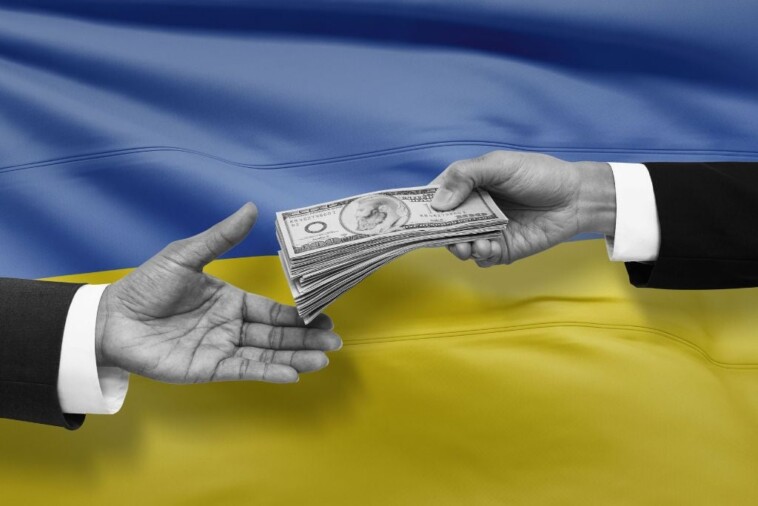On October 22, US Treasury Secretary Janet Yellen announced that the United States and its Group of Seven (G7) allies agree to formalizing a plan to provide a loan of up to $50 billion to Ukraine, a country that continues to resist Russian invasion.
The Secretary of the Treasury of USA was confident that the G7 would move forward with the USD 50 billion loan to Ukraine.
He confirmed that “productive discussions” had taken place with the leaders and that the agreement could move forward and will be delivered as soon as December
The initiative is part of a joint agreement by G7 members, including the United States, Canada, France, Germany, Italy, Japan and the United Kingdom, who are seeking to support Kyiv through a financial package that uses frozen Russian assets in Europe as collateral.
The G7 provisionally agreed in June 2024 to provide this loan, with the United States being one of the main contributors with a contribution of approximately $20 billion.
This amount adds to the $175 billion the United States has already allocated to Ukraine since the start of the conflict in 2022, consolidating its position as Kyiv’s largest financial supporter during the war.
Yellen stressed that although the loan involves large sums of money, it will not directly affect American taxpayers, as it will be guaranteed by Russian assets blocked under the control of the European Union (EU) since 2014, when Russia annexed Crimea.
For the Treasury Secretary, European participation is key, and she considered it «unthinkable» that the EU would not maintain these sanctions and frozen assets for the duration of the war.
The United States and other G7 members have almost agreed on a loan for Ukraine with repayment of proceeds from frozen Russian assets, the head of the US Treasury announced.
According to Janet Yellen, the White House is close to completing work on the part pic.twitter.com/toC3Mkoy1T
The proposed loan also requires the periodic renewal of sanctions imposed on Russia by the EU. Every six months, member states must approve the continuation of measures freezing Russian assets.
Despite the potential political difficulties that this renewal process could face, Yellen expressed confidence that Europe will continue to maintain these locks as part of its commitment to support Ukraine. The Russian assets in question account for a significant part of the economic backing of the loan and have been subject to restrictions since Russia’s intervention in Crimea in 2014.
One of the most prominent challenges in this agreement has been ensuring that the frozen assets remain blocked indefinitely. The US Treasury Secretary has asked the EU for additional reinforcement of guarantees to ensure that these assets will continue to support assistance to Ukraine.
This support is crucial, according to her, since Russian assets form the basis that guarantees the solvency of the loan, allowing the G7 nations, and in particular the United States, to minimize the risks for their own taxpayers.
In addition to the United States, other G7 member countries have shown their willingness to contribute significantly to this financial package. The United Kingdom, for example, confirmed its commitment to provide 2.26 billion pounds (approximately 2.93 billion dollars) as part of its contribution to the loan for Ukraine.
Press release
The UK strengthens national security and bolsters Ukraine’s military budget with a
£2.26 billion loan Ukraine to receive more
funds to purchase essential military equipment to defend itself against invasion
illegal from Russia, as the Minister of Finance announces today that the Government will grant a new
£2.26 billion loan to Ukraine. Fountain:
Treasure of His Majesty and the Most Honorable
Rachel Reeves MP
Publication date: October 22, 2024
This contribution is essential for the G7 global initiative to move forward, and other non-EU countries are also apparently expected to make contributions.
The EU’s total contribution to the loan is not yet fully defined, as it depends on what G7 members outside the eurozone contribute.
The European Parliament voted on Oct. 22 in favor of a plan that could raise the sum to as much as 35 billion euros ($38 billion), although the final amount is likely to be lower depending on individual countries’ contributions.
European Parliament approves loan of up to €35 billion to Ukraine backed by Russian assets.
This loan is part of a G7 package agreed last June to provide up to $50 billion in financial support to Kyiv.
EU’s suicidal course
Maria Zakharova pointed out that the European Union had lost independence
The European Union had “lost its mind” and is subservient to Washington’s goals.
European Commission President Ursula von der Leyen pledged to lend Ukraine up to 35 billion euros… pic.twitter.com/HHuaEFh1wQ
— Ignorance, the root and stem of all evil (@ivan_8848) September 21, 2024
Financial support from Europe has been critical in sustaining Ukraine during this conflict, and is expected to continue to be a key piece in efforts to weaken the Russian economy and keep Ukraine in the fight.
While the United States and its European allies coordinate the loan, the Biden administration continues to increase pressure on Russia through economic sanctions. Yellen mentioned that they are preparing a new round of sanctions, which could be announced as early as next week.
These measures will not only target Russia, but also third countries that help the Kremlin evade existing sanctions or provide critical supplies to the Russian military. While Yellen did not reveal which entities or countries would be targeted by these new sanctions, she made clear that the administration will not tolerate indirect aid to the Russian military machine.
The tightening of sanctions is part of a broader strategy to economically isolate Russia and weaken its military capabilities. Since the beginning of the war, several countries, including China and Turkey, have been singled out for trading with Russia despite Western-imposed sanctions.
The United States and its Biden-Harris administration are seeking to curb these trade relations through more restrictive measures, which could include economic blockades or trade restrictions on those who continue to support the Putin regime.
While the $50 billion loan is moving forward internationally, the future of U.S. support for Ukraine could hinge on the upcoming presidential election on November 5, 2024. Vice President Kamala Harris has expressed her commitment to continuing the Biden administration’s current policy if elected president.
By contrast, former President Donald Trump, who is seeking another term in the White House, has been more reticent about continuing to fund the Ukrainian war effort. Trump has signaled that he would speed up negotiations to end the war if he returns to power.
“I think Zelensky is one of the best salesmen I have ever seen. Every time he comes, we give him $100 billion.”, Trump said on the PBD Podcast. “Who else in history has ever received that amount of money? There has never been. And that doesn’t mean I don’t want to help him because I feel very bad for those people. But he should never have let that war start. That war is a waste.”.
Trump met Zelensky today and the boss in the conversation is clear.
Trump reiterates that the war shouldn’t have happened, and vows to end it.
Meanwhile dems are signing bombs and writing cheques.
Not just America needs Trump in November, the world, for the sake of peace. pic.twitter.com/OTXSV39iZU
— Tommy Robinson 🇬🇧 (@TRobinsonNewEra) September 27, 2024
The impending agreement between the United States and the G7 to provide a $50 billion loan to Ukraine marks a clear step in support for this nation. With frozen Russian assets as collateral and the collaboration of European allies, the plan seeks to provide Ukraine with the financial resources necessary to continue its defense against Russia. It is clear where this administration’s support is directed…

María Herrera Mellado es una abogada de EE.UU. y licenciada en España. Doctora en Ciencias Jurídicas y Analista política. La Dra. Herrera es conocida por su amplia experiencia en análisis y consultas en el diseño de políticas públicas, propuestas de ley y gestión en relaciones internacionales.
Su reconocimiento proviene de sus contribuciones al análisis y representación legal de diversas organizaciones, empresas e individuos que han visto abusados sus derechos humanos, su privacidad o en la inclusión de políticas efectivas fundamentalmente en el ámbito de la transparencia y la rendición de cuentas, así como la lucha contra la corrupción.
Su formación académica y experiencias profesionales la convierten en una voz respetada en el debate público y en el análisis de temas de actualidad sobre todo en los desafíos políticos y legales contemporáneos.
María Herrera Mellado is a U.S.-based attorney also licensed in Spain. She holds a PhD in Legal Sciences and is known as a media legal and policy analyst.
Dr. Herrera is recognized for her extensive experience in analyzing and consulting on public policy design, legislative proposals, and international relations management.
Her recognition stems from her contributions to the analysis and legal representation of various organizations, companies, and individuals whose human rights or privacy have been violated, or who have benefited from the inclusion of effective policies, primarily in the areas of transparency, accountability, and the fight against corruption.
Her academic background and professional experience make her a respected voice in public debate and in the analysis of current issues, particularly in contemporary political and legal challenges.


